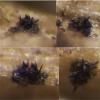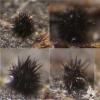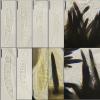
12-01-2026 22:02
Ethan CrensonHello all, I am hoping someone will have some ins

11-01-2026 20:35
Hello.A very tiny pyrenomycete sprouting sparsely

12-01-2026 05:24
 Danny Newman
Danny Newman
Cyathicula coronata on Urtica dioicaCataloochee Di

15-12-2025 11:49
 Danny Newman
Danny Newman
ITS sequences from the following two collections B

09-01-2026 17:41
Arnold BüschlenHallo, F. dilatata wird von vielen Bryoparasiten

10-01-2026 20:00
Tom SchrierHi all,We found picnidia on Protoparmeliopsis mur

07-01-2026 22:22
 Danny Newman
Danny Newman
Tatraea sp. on indet. hardwood The Swag, Great Sm

10-01-2026 01:18
 Danny Newman
Danny Newman
cf. Neovaginatispora fuckelii on indet. shrub Pre

07-01-2026 10:24
 Danny Newman
Danny Newman
Pezicula sp. on indet. hardwood Appalachian Highl

09-01-2026 10:08
 Blasco Rafael
Blasco Rafael
Hola, en el mismo habitat que la anteriorRetamaDia
Another hairy pyreno
Gernot Friebes,
10-03-2010 22:07
next to my pyreno with muriform spores I found this even smaller fungus. The spores are 50-54 x 4,5-5 µm, hyaline, 8- to 12-celled and always bent. The asci are bitunicate, 8-spored, inverted clavate and IKI-. The hairs are dark brown, straight and acute. I didn't arrive at any result...
Best wishes,
Gernot
Alain GARDIENNET,
10-03-2010 22:29
Re:Another hairy pyreno
Acanthostigma minutum ?
Jacques Fournier,
10-03-2010 22:33

Re:Another hairy pyreno
Hi Gernot,
this is most likely an Acanthostigma (Tubeufiaceae) because of its small pale-coloured ascomata with a bunch of dark stiff setae around the ostiole, and spore shape. The spore dimensions you give do not fit well the common A. minutum and more resemble those of A. scopulum (56-78 x 2.5-3 µm) in being more narrow and curved. In fact your fungus appears somewhat intermediate between the two species.
Could you check the dimensions again?
Cheers,
Jacques
this is most likely an Acanthostigma (Tubeufiaceae) because of its small pale-coloured ascomata with a bunch of dark stiff setae around the ostiole, and spore shape. The spore dimensions you give do not fit well the common A. minutum and more resemble those of A. scopulum (56-78 x 2.5-3 µm) in being more narrow and curved. In fact your fungus appears somewhat intermediate between the two species.
Could you check the dimensions again?
Cheers,
Jacques
Alain GARDIENNET,
10-03-2010 23:14
Re:Another hairy pyreno
Questions for Jacques,
In fact it's the length of scopulum's spores and the width of minutum's spores ?
I would like to know if, as Margaret Barr noted, scopula is mostly restricted to coniferous trees ? Do you know recolts on deciduous trees ?
But wait for other measures of ascospores.
Alain
In fact it's the length of scopulum's spores and the width of minutum's spores ?
I would like to know if, as Margaret Barr noted, scopula is mostly restricted to coniferous trees ? Do you know recolts on deciduous trees ?
But wait for other measures of ascospores.
Alain
Gernot Friebes,
10-03-2010 23:19
Re:Another hairy pyreno
Hi Alain and Jacques,
thank you very much for your answers! A. minutum also grew on that branch but it is really different to me due to it's bigger ascomata and spores. It fits very well to the description of Barr & Réblová and to the fungus which Zotto showed once ( http://www.ascofrance.fr/index.php?r=forum&page=viewtopic&id=7665&highlight=minutum#msg7675 ).
The form of the spores within this collection (the one I showed above) would fit A. scopulum really very well but not the width, as you mentioned, so I will check on this again.
Here I have pictures of A. minutum.
Best wishes,
Gernot
thank you very much for your answers! A. minutum also grew on that branch but it is really different to me due to it's bigger ascomata and spores. It fits very well to the description of Barr & Réblová and to the fungus which Zotto showed once ( http://www.ascofrance.fr/index.php?r=forum&page=viewtopic&id=7665&highlight=minutum#msg7675 ).
The form of the spores within this collection (the one I showed above) would fit A. scopulum really very well but not the width, as you mentioned, so I will check on this again.
Here I have pictures of A. minutum.
Best wishes,
Gernot
Jacques Fournier,
11-03-2010 12:51

Re:Another hairy pyreno
the spores are obviouly too narrow for minutum and too broad for scopulum.
A. minutum has a small ascomata, so when you say those of your fungus are smaller they are indeed very small?
I suggest you check your fungus against Reblova & Barr's description of A. minutum and list all the differences. Maybe a professional will be interested....
Jacques
A. minutum has a small ascomata, so when you say those of your fungus are smaller they are indeed very small?
I suggest you check your fungus against Reblova & Barr's description of A. minutum and list all the differences. Maybe a professional will be interested....
Jacques
Andrew N. Miller,
11-03-2010 16:24

Re:Another hairy pyreno
Acanthostigma ellisii. Key below from my paper in press at Mycologia. It will appear in the May-June 2010 issue.
Andy
KEY TO SPECIES OF ACANTHOSTIGMA2
1.1 Ascospores less than 5 mm wide . . . . . . . . . . . . . . . 2
1.2 Ascospores $5 mm wide . . . . . . . . . . . . . . . . . . . . . 6
2.1 Ascospores up to 4 mm wide. . . . . . . . . . . . . . . . . . 3
2.2 Ascospores 4–5 mm wide . . . . . . . . . . . . . . . . . . . . 5
3.1 Ascospores 22–27 3 3–3.5 mm, 5(–9)-septate. . . .
. . . . . . . . . . . . . . . . . . . . . . . . . . . . . . . A. revocatum
3.2 Ascospores more than 30 mm long . . . . . . . . . . . . . 4
4.1 Ascospores (40–)56–78(–95) 3 (2–)2.5–3(–3.5) mm,
10–14-septate. . . . . . . . . . . . . . . . . . . . . A. scopulum
4.2 Ascospores (75–)85–135(–150) 3 2.5–4 mm, 12–16-
septate . . . . . . . . . . . . . . . . . . . . . . . . . . A. filiforme
5.1 Ascospores (29–)38–51 3 4–4.5(–5), (4–)6–8-septate
. . . . . . . . . . . . . . . . . . . . . . . . . . . A. longisporum
5.2 Ascospores (38–)48–64.5 3 4–4.5 mm, 6–12-septate
. . . . . . . . . . . . . . . . . . . . . . . . . . . . . . . . A. ellisii
6.1 Ascospores not or slightly constricted at the septa . 7
6.2 Ascospores constricted at the septa, 40–50 3 5–
6.5 mm, 7–10-septate . . . . . . . . . . A. septoconstrictum
7.1 Ascospores 30.5–35.5(–42) 3 5–6 mm, (5–)6–7(–8)-
septate . . . . . . . . . . . . . . . . . . . . . . . A. perpusillum
7.2 Ascospores longer, $10-septate . . . . . . . . . . . . . . . 8
8.1 Ascospores 40–55(–63) 3 (5–)6–7(–7.5) mm, 10–14-
septate . . . . . . . . . . . . . . . . . . . . . . . . . A. minutum
8.2 Ascospores 60–90 3 5–7.5 mm, 14–18-septate . . .
. . . . . . . . . . . . . . . . . . . . . . . . . . . . A. multiseptatum
Andy
KEY TO SPECIES OF ACANTHOSTIGMA2
1.1 Ascospores less than 5 mm wide . . . . . . . . . . . . . . . 2
1.2 Ascospores $5 mm wide . . . . . . . . . . . . . . . . . . . . . 6
2.1 Ascospores up to 4 mm wide. . . . . . . . . . . . . . . . . . 3
2.2 Ascospores 4–5 mm wide . . . . . . . . . . . . . . . . . . . . 5
3.1 Ascospores 22–27 3 3–3.5 mm, 5(–9)-septate. . . .
. . . . . . . . . . . . . . . . . . . . . . . . . . . . . . . A. revocatum
3.2 Ascospores more than 30 mm long . . . . . . . . . . . . . 4
4.1 Ascospores (40–)56–78(–95) 3 (2–)2.5–3(–3.5) mm,
10–14-septate. . . . . . . . . . . . . . . . . . . . . A. scopulum
4.2 Ascospores (75–)85–135(–150) 3 2.5–4 mm, 12–16-
septate . . . . . . . . . . . . . . . . . . . . . . . . . . A. filiforme
5.1 Ascospores (29–)38–51 3 4–4.5(–5), (4–)6–8-septate
. . . . . . . . . . . . . . . . . . . . . . . . . . . A. longisporum
5.2 Ascospores (38–)48–64.5 3 4–4.5 mm, 6–12-septate
. . . . . . . . . . . . . . . . . . . . . . . . . . . . . . . . A. ellisii
6.1 Ascospores not or slightly constricted at the septa . 7
6.2 Ascospores constricted at the septa, 40–50 3 5–
6.5 mm, 7–10-septate . . . . . . . . . . A. septoconstrictum
7.1 Ascospores 30.5–35.5(–42) 3 5–6 mm, (5–)6–7(–8)-
septate . . . . . . . . . . . . . . . . . . . . . . . A. perpusillum
7.2 Ascospores longer, $10-septate . . . . . . . . . . . . . . . 8
8.1 Ascospores 40–55(–63) 3 (5–)6–7(–7.5) mm, 10–14-
septate . . . . . . . . . . . . . . . . . . . . . . . . . A. minutum
8.2 Ascospores 60–90 3 5–7.5 mm, 14–18-septate . . .
. . . . . . . . . . . . . . . . . . . . . . . . . . . . A. multiseptatum
Jacques Fournier,
11-03-2010 16:31

Re:Another hairy pyreno
thanks so much Andy for your expert answer!
Your key is certainly fine but it will be easier to use when it is not encoded!
We'll be patient until the next issues of Mycologia.
Gernot you are lucky for this time, you got a name for your fungus!
Jacques
Your key is certainly fine but it will be easier to use when it is not encoded!
We'll be patient until the next issues of Mycologia.
Gernot you are lucky for this time, you got a name for your fungus!
Jacques
Andrew N. Miller,
11-03-2010 16:44

Re:Another hairy pyreno
The decoded version costs extra Euros... ;o)
Sorry about that! I have uploaded the entire article as a PDF. Enjoy...
Andy
Sorry about that! I have uploaded the entire article as a PDF. Enjoy...
Andy
Jacques Fournier,
11-03-2010 16:57

Re:Another hairy pyreno
thanks Andy,
species of Acantostigma often show up on Ascofrance, so your fine paper will be very useful to us, for a very reasonable price indeed!
Jacques
species of Acantostigma often show up on Ascofrance, so your fine paper will be very useful to us, for a very reasonable price indeed!
Jacques
Gernot Friebes,
11-03-2010 17:37
Re:Another hairy pyreno
Hi,
thank you very much, Andy! It's great you uploaded your paper, it's really helpful. So I have A. ellisii and A. minutum on one piece of branch, I guess this is a great coincidence.
@Jacues: Yes, the ascomata of A. ellisii were really very small, quite challenging to take a photo of them.
Best wishes,
Gernot
thank you very much, Andy! It's great you uploaded your paper, it's really helpful. So I have A. ellisii and A. minutum on one piece of branch, I guess this is a great coincidence.
@Jacues: Yes, the ascomata of A. ellisii were really very small, quite challenging to take a photo of them.
Best wishes,
Gernot
Andrew N. Miller,
11-03-2010 17:57

Re:Another hairy pyreno
You are most welcome. I would not be surprised if you had more than one species of Acanthostigma growing on the same piece of wood. They tend to fruit at the same time on similar substrates.
Andy
Andy
Martin Bemmann,
11-03-2010 20:08

Re:Another hairy pyreno
Thank you for sharing your paper with us!
Best regards,
Martin
Best regards,
Martin
Alain GARDIENNET,
11-03-2010 21:14
Re:Another hairy pyreno
I just reappointed an old recolt of Acanthostigma. It also was A. ellisii.
Thanks a lot !
Alain
Thanks a lot !
Alain
Luc Bailly,
12-03-2010 12:11
Re:Another hairy pyreno
Great paper for this interesting genus, thanks for sharing!




 10752.pdf
10752.pdf